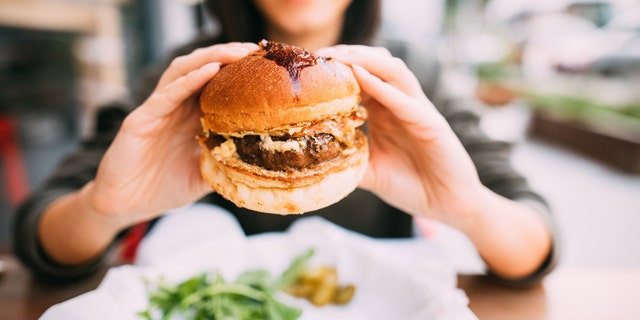Healthy living habits include eating dinner earlier — it may also help keep
The time you eat dinner in the evening significantly affects how many calories you burn during the day, your appetite and your adipose — or fat — tissue in your body, according to a study done by Harvard Medical School investigators at Brigham and Women’s Hospital.
The study, published in Cell Metabolism, found that late eating doubled the odds of being hungry, as compared to early eating.
“Accumulating data suggest that eating earlier in the day is associated with lower body weight and improved weight loss success,” senior author Frank A.J.L. Scheer, Ph.D., professor of medicine at Harvard Medical School and director of the medical chronobiology program at Brigham and Women’s Hospital in Boston told Fox News Digital.
Scheer, who is a neuroscientist as well, said the study simultaneously looked at three mechanisms in the body that could explain weight gain associated with eating late.
The researchers said previous studies suggested that eating late is associated with a higher risk of obesity and decreased success with losing weight — and the team wanted to understand why.

The participants in a new study completed two different eating schedules: one in which they followed a strict early meal schedule — then another in which they ate the same meals but four hours later in the day.
(iStock)
“The three [mechanisms] were hunger regulation, how many calories we burn and changes in our fat tissue,” Scheer said.
Sixteen participants in the study, he said, stayed in a laboratory to allow the investigators to control for other factors, such as how much and what participants ate, their level of physical activity, their sleep and the environmental temperature and light exposure — which may otherwise influence their measurements.
LOOK YOUNGER, LOSE WEIGHT: ADD PUMPKIN TO YOUR DIET
“We found that late eating influenced all three biological mechanisms, all in the direction that would promote weight gain,” said Scheer.
“Late eating increased hunger and appetite across the day (including related hormones), decreased the amount of calories burned across the day and changed molecular pathways in fat tissue that would promote fat growth.”
“We found that eating four hours later makes a significant difference for our hunger levels, the way we burn calories after we eat and the way we store fat.”
First author Nina Vujović, a researcher in the Medical Chronobiology Program, said in a Harvard University news release, “In this study, we asked, Does the time that we eat matter when everything else is kept consistent.”
The study’s 16 participants all had a body mass index considered in the overweight or obese range — and they followed specific in-laboratory protocols.

Three days before entering the laboratory, the participants in a new study followed identical diets and meal schedules at home.
(iStock)
Each participant completed two different eating schedules: one in which they followed a strict early meal schedule — then another in which they ate the same meals but four hours later in the day.
Two to three weeks prior to starting each of the in-lab meal regimens, the participants followed a fixed sleeping and wake schedule; then, three days before entering the laboratory, the participants strictly followed identical diets and meal schedules at home.
MORNING HABITS DOCTORS AND PSYCHOLOGISTS WISH YOU WOULD DO
“We found that eating four hours later makes a significant difference for our hunger levels, the way we burn calories after we eat and the way we store fat,” Vujović said in the news release.
The participants kept a record of their level of hunger and appetite and the researchers took blood samples throughout the day, checked the participants’ body temperature and measured their energy expenditure.

The late-eating participants in a new study burned calories at a slower rate compared to when they were on the early eating schedule.
(iStock)
The researchers explored how eating time affected the way the body stores fat by taking biopsies of the participants’ adipose tissues during laboratory testing in both the early and late eating protocols.
They compared the difference between the two eating routines.
The adipose tissue gene expression showed increased adipogenesis (fat storage) and decreased lipolysis (fat breakdown), which contributes to fat growth, according to the study.
Late eating had a significant effect on the body’s hormones, leptin and ghrelin, that control appetite and a person’s drive to eat.
The late-eating participants also burned calories at a slower rate compared to the early eating schedule.
The investigators also said late eating had a significant effect on the body’s hormones, leptin and ghrelin, that control appetite and a person’s drive to eat.
HEALTHY BREAKFAST SMOOTHIE COULD HELP KICKSTART BETTER EATING HABITS…
Read More: Healthy living habits include eating dinner earlier — it may also help keep

